人教版九年级英语中考复习-动词时态
- 格式:pptx
- 大小:2.55 MB
- 文档页数:23
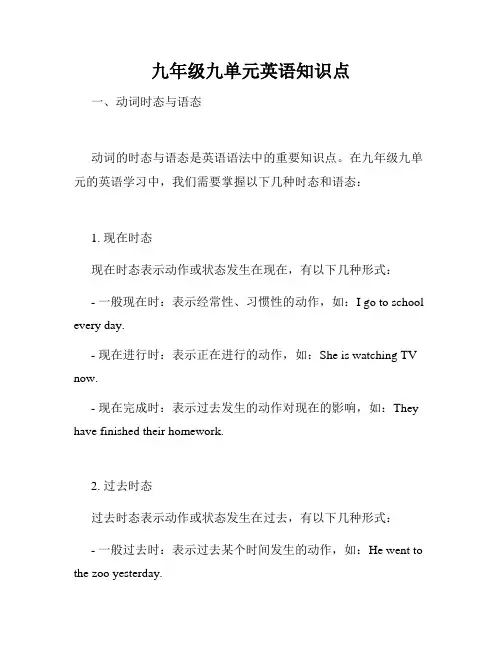
九年级九单元英语知识点一、动词时态与语态动词的时态与语态是英语语法中的重要知识点。
在九年级九单元的英语学习中,我们需要掌握以下几种时态和语态:1. 现在时态现在时态表示动作或状态发生在现在,有以下几种形式:- 一般现在时:表示经常性、习惯性的动作,如:I go to school every day.- 现在进行时:表示正在进行的动作,如:She is watching TV now.- 现在完成时:表示过去发生的动作对现在的影响,如:They have finished their homework.2. 过去时态过去时态表示动作或状态发生在过去,有以下几种形式:- 一般过去时:表示过去某个时间发生的动作,如:He went to the zoo yesterday.- 过去进行时:表示过去某个时间正在进行的动作,如:They were playing basketball at 3 o'clock yesterday.- 过去完成时:表示过去某个时间之前已经完成的动作,如:I had finished my homework before dinner.3. 将来时态将来时态表示将要发生的动作或状态,有以下几种形式:- 一般将来时:表示将来某个时间发生的动作,如:She will go to the park tomorrow.- 将来进行时:表示将来某个时间正在进行的动作,如:We will be watching a movie this time tomorrow.- 将来完成时:表示将来某个时间之前已经完成的动作,如:By this time next week, I will have finished my project.4. 被动语态被动语态表示动作的承受者在句子中是重要的,动作的执行者在句子中不明确或不重要。
通过动词be的不同形式和过去分词构成被动语态,如:The book was written by Mark Twain.二、名词和名词性从句名词和名词性从句是九年级九单元英语中的另一个重要知识点。
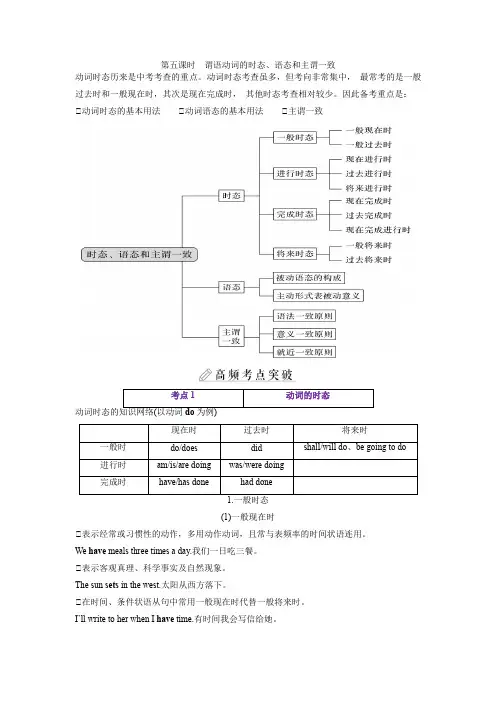
第五课时谓语动词的时态、语态和主谓一致动词时态历来是中考考查的重点。
动词时态考查虽多,但考向非常集中,最常考的是一般过去时和一般现在时,其次是现在完成时,其他时态考查相对较少。
因此备考重点是:①动词时态的基本用法①动词语态的基本用法①主谓一致考点1动词的时态(1)一般现在时①表示经常或习惯性的动作,多用动作动词,且常与表频率的时间状语连用。
We have meals three times a day.我们一日吃三餐。
①表示客观真理、科学事实及自然现象。
The sun sets in the west.太阳从西方落下。
①在时间、条件状语从句中常用一般现在时代替一般将来时。
I’ll write to her when I have time.有时间我会写信给她。
1.Mike often (收集)stamps and plays basketball in his spare time.【答案】collects本题考查动词的时态。
由and plays可知,此空为一般现在时,主语Mike为第三人称单数,故谓语动词应用第三人称单数形式。
2.And then it just (grow) and makes the world a better place.【答案】grows本题考查动词的时态。
此处主语it为第三人称单数。
由于and连接的前后两个动词为并列关系,根据makes可知时态为一般现在时,故填grows。
3.We can see clearly that Mongolia (位于) between China and Russia on the map. 【答案】lies句意:我们在地图上可以清楚地看到蒙古位于中国和俄罗斯之间。
本题考查动词的时态。
时态用一般现在时,Mongolia是第三人称单数,因此从句的谓语动词用第三人称单数形式。
4.Mary is crazy about reading. She b a lot of books from the school library every time.【答案】borrows句意:Mary酷爱阅读。
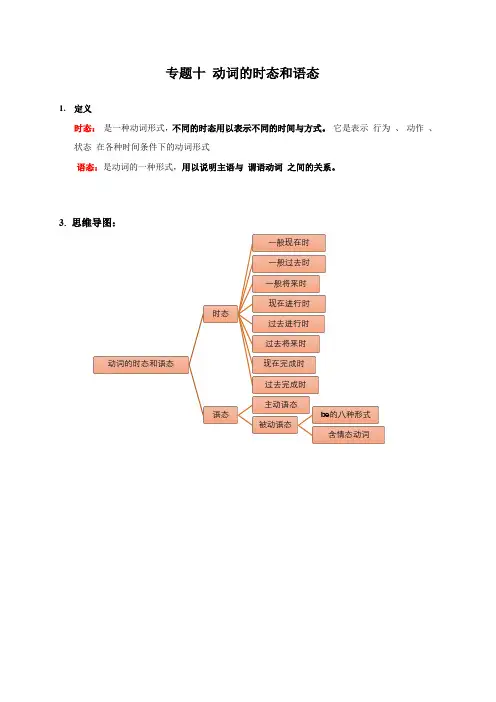
专题十动词的时态和语态1.定义时态:是一种动词形式,不同的时态用以表示不同的时间与方式。
它是表示行为、动作、状态在各种时间条件下的动词形式语态:是动词的一种形式,用以说明主语与谓语动词之间的关系。
3. 思维导图:动词的时态和语态时态一般现在时一般过去时一般将来时现在进行时过去进行时过去将来时现在完成时过去完成时语态主动语态被动语态be 的八种形式含情态动词1.动词的时态1.常考的时态构成及用法a.一般现在时d.现在进行时e.过去进行时f.过去将来时g.现在完成时h.过去完成时2. 动词的语态a. 分类:主动语态:表示主语是动作的执行者被动语态:表示并语是动作的执行者c.主动语态和被动语态的转换规则典型例题总分:50分姓名:得分:1.单选题(每小题1分,共50分)( ) 1. Jenny, together with the Greens the White Tower Park if it tomorrow.A.are going to; isn't rainyB.is going to; doesn't rainC.are going to; won't rainD.is going to; isn't rain( ) 2. The old man for quite some time.A.has diedB.dieC.has deadD.has been dead( ) 3. It is reported that a tall building in the city next year.A.will be builtB.were buildC.have builtD.will build( ) 4. My sister for 2 years.A.has marriedB.have got marriedC.has been marriedD.married( ) 5. Chinese ________in many schools around the world and many people love to learn it.A.teachesB.is teachingC.has taughtD.is taught( ) 6. When Tom was in primary school, he ________the piano every day.A.playsB.playedC.was playingD.has played( ) 7. A baby's first month birthday is a special event in China and _____with a special Party.A.celebratesB.is celebratedC.was celebratedD.will celebrate( ) 8. -Were you at home at 9 o'clock last night?-Yes, I a shower at that time.A.tookB.was takingC.was takenD.am taking( ) 9. National Day celebrations for China's seventieth birthday in about three months.A.will be heldB.will holdC.is heldD.was held( ) 10. We don't know if he tomorrow. If he, I will call youA.will come, will comeB.will come, comeses, will comees, comes( ) 11. He told me that he ______ his uncle in Thailand the next day.A.will visitB.has visitedC.is going to visitD.would visit( ) 12. -Tom, do you know ________? -In Beijing.A.where will the 24th Winter Olympics be heldB.where the 24th Winter Olympics will holdC.where the 24th Winter Olympics will be heldD.where will the 24th Winter Olympics hold( ) 13. Peter with his classmates ________ for the bus when the earthquake happened.A.is waitingB.was waitingC.are waitingD.were waiting( ) 14. his museum ________ here for over 80 years. It ________ one of the oldest buildings in this city.A.is; wasB.had been; isC.was; has beenD.has been; is( ) 15. -Mrs. Brown, how long can books from the school library ?-At most two weeks.A.borrowB.keepC.be borrowedD.be kept( ) 16.-An AI robot _____in our school dining hall next term.-I'm looking forward to it.A.will useB.will be usedC.is usedD.was used( ) 17. Usually a baby's face ____ smooth.A.is feelingB.feltC.feels likeD.feels( ) 18. She _____ an English magazine when I came in.A.readsB.has readC.will readD.was reading( ) 19. I will call you as soon as he______ here.A.arriveB.will arriveC.arrivesD.arrived( ) 20. Boys and girl, ______ learning and have fun!A.keepB.to keepC.keepingD.kept( ) 21. There ______a basketball game between these two grades in the gym this afternoon.A.willB.is going to haveC.is going to beD.will have( ) 22. We ______TV from seven to nine last night.A.were watchingB.will watchC.watchedD.watch( ) 23. Jack's mother taught me how ________ Yunnan rice noodles last weekend.A.to makeB.makingC.makeD.to making( ) 24. Mrs. Green said the plates ________ right away,or they would become difficult to wash.A.will be washedB.should washC.will washD.should be washed( ) 25. The documentary Under the Dome (《苍穹之下》)which ________ by Chai Jing showed us that the air pollution in China was very serious.A.producesB.producedC.is producedD.was produced( ) 26. -What did you do last night?- I ________ my homework and watched TV.A.didB.doC.am doingD.will do( ) 27.The hospital is very famous. It _______ in 2001.A.buildsB.builtC.was builtD.is built( ) 28.These rules are made the disabled.A.protectB.protectedC.to protectD.protecting( ) 29. -How much does the TV ?-Not too much. It's just a second-handed one.A.costB.spendC.takeD.pay for( ) 30. -Have you ever ________ an amusement park?- Yes, I have ________ Fun Times Amusement Park last year.A.been to, have gone toB.gone to, have been toC.go to, went toD.been to, went to( ) 31.We are glad to hear that the terrorists ________ by the brave policemen several days ago.A.are caughtB.were caughtC.have been caughtD.are going to be caught ( ) 32. -Why didn't you go to the party last night? - Because I _____.A.wasn't invitedB.didn't invitedC.haven't invitedD.don't invited ( ) 33. -What _____ you supposed ____ when you are in China?- You should shake hands.A.are, to doB.do, to doC.are, doingD.have, to do( ) 34. So far, we ________ English for three years.A.have learntB.learnC.learntD.had learnt( ) 35.The boy was made ______ the words again and again.A.copyB.copyingC.copiesD.to copy( ) 36. The sports meeting in our school now.A.being heldB.is havingC.is holdingD.is being held( ) 37. The window ____ ten minutes ago, and the room is bright now.A.can be cleanedB.is cleanedC.was cleanedD.will be cleaned( ) 38. -Oh, Mrs. King, your necklace looks nice. Is it new?-No, I _______ it for 2 years.A.hadB.have hadC.boughtD.have bought( ) 39. He has ordered a watch on line for his father and it _______ to him before Father's Day.A.sendB.will be sentC.was sentD.sent( ) 40. There ______ a funny cartoon on CCTV 6 this evening.A.willB.will haveC.is going to beD.is going to have( ) 41. -________ did your uncle leave his home town? -He ___________ for nearly twenty years.A.When, has leftB.When, has been awayC.How long, has leftD.How long, has been away ( ) 42. My uncle ________ Germany on business many times.A.has been onB.has gone toC.has been toD.has been in( ) 43. Her life ________ a lot during the last three years.A.changedB.changingC.has changedD.will change( ) 44. -Lisa was seen ______ an old man go across the street this morning. -What a kind girl she is!A.helpingB.helpedC.to helpD.helps( ) 45. My computer has broken down. I'll get it _______ this afternoon.A.repairsB.repairedC.to repairD.repairing。
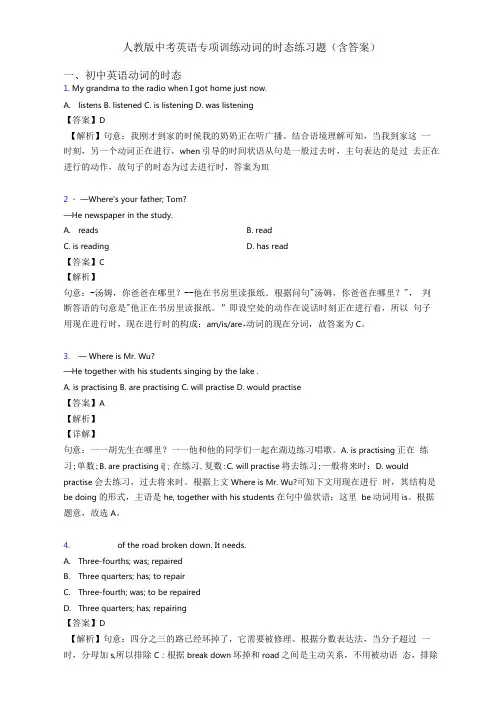
人教版中考英语专项训练动词的时态练习题(含答案)一、初中英语动词的时态1. My grandma to the radio when I got home just now.A.listensB. listenedC. is listeningD. was listening【答案】D【解析】句意:我刚才到家的时候我的奶奶正在听广播。
结合语境理解可知,当我到家这一时刻,另一个动词正在进行,when引导的时间状语从句是一般过去时,主句表达的是过去正在进行的动作,故句子的时态为过去进行时,答案为皿2 ・—Where's your father; Tom?—He newspaper in the study.A.readsB. readC. is readingD. has read【答案】C【解析】句意:-汤姆,你爸爸在哪里?--他在书房里读报纸。
根据问句"汤姆,你爸爸在哪里?",判断答语的句意是"他正在书房里读报纸。
”即设空处的动作在说话时刻正在进行着,所以句子用现在进行时,现在进行时的构成:am/is/are+动词的现在分词,故答案为C。
3.— Where is Mr. Wu?—He together with his students singing by the lake .A. is practisingB. are practisingC. will practiseD. would practise【答案】A【解析】【详解】句意:一一胡先生在哪里?一一他和他的同学们一起在湖边练习唱歌。
A. is practising正在练习;单数;B. are practising i|;在练习,复数:C. will practise将去练习;—般将来时:D. would practise会去练习,过去将来时。
根据上文Where is Mr. Wu?可知下文用现在进行时,其结构是be doing的形式,主语是he, together with his students在句中做状语;这里be动词用is。

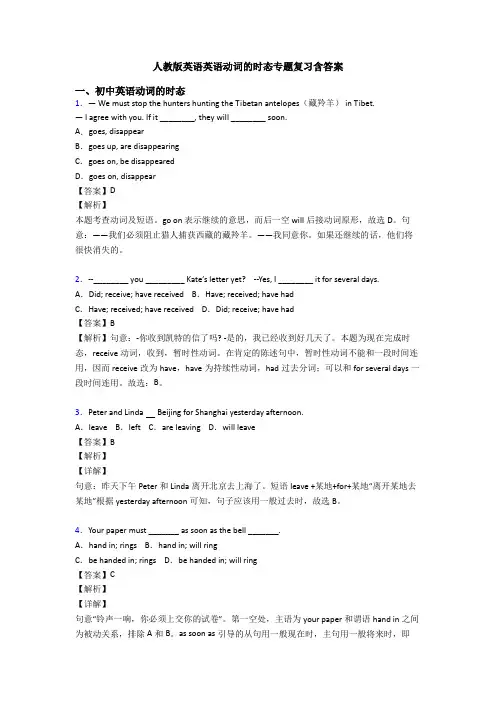
人教版英语英语动词的时态专题复习含答案一、初中英语动词的时态1.— We must stop the hunters hunting the Tibetan antelopes(藏羚羊) in Tibet.— I agree with you. If it ________, they will ________ soon.A.goes, disappearB.goes up, are disappearingC.goes on, be disappearedD.goes on, disappear【答案】D【解析】本题考查动词及短语。
go on 表示继续的意思,而后一空will后接动词原形,故选D。
句意:——我们必须阻止猎人捕获西藏的藏羚羊。
——我同意你。
如果还继续的话,他们将很快消失的。
2.--________ you _________ Kate’s letter yet? --Yes, I ________ it for several days. A.Did; receive; have received B.Have; received; have hadC.Have; received; have received D.Did; receive; have had【答案】B【解析】句意:-你收到凯特的信了吗? -是的,我已经收到好几天了。
本题为现在完成时态,receive动词,收到,暂时性动词。
在肯定的陈述句中,暂时性动词不能和一段时间连用,因而receive改为have,have为持续性动词,had过去分词;可以和for several days一段时间连用。
故选:B。
3.Peter and Linda Beijing for Shanghai yesterday afternoon.A.leave B.left C.are leaving D.will leave【答案】B【解析】【详解】句意:昨天下午Peter和 Linda离开北京去上海了。
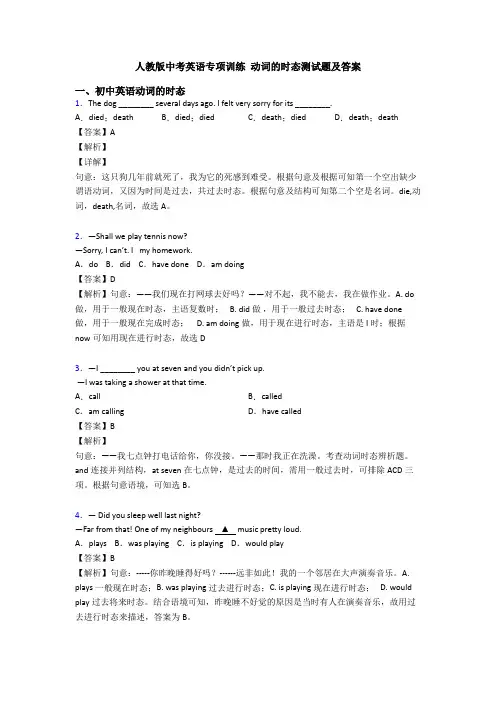
人教版中考英语专项训练动词的时态测试题及答案一、初中英语动词的时态1.The dog ________ several days ago. I felt very sorry for its ________.A.died;death B.died;died C.death;died D.death;death【答案】A【解析】【详解】句意:这只狗几年前就死了,我为它的死感到难受。
根据句意及根据可知第一个空出缺少谓语动词,又因为时间是过去,共过去时态。
根据句意及结构可知第二个空是名词。
die,动词,death,名词,故选A。
2.—Shall we play tennis now?—Sorry, I can’t. I my homework.A.do B.did C.have done D.am doing【答案】D【解析】句意:——我们现在打网球去好吗?——对不起,我不能去,我在做作业。
A. do 做,用于一般现在时态,主语复数时; B. did做,用于一般过去时态; C. have done 做,用于一般现在完成时态; D. am doing做,用于现在进行时态,主语是I时;根据now可知用现在进行时态,故选D3.—I ________ you at seven and you didn’t pick up.—I was taking a shower at that time.A.call B.calledC.am calling D.have called【答案】B【解析】句意:——我七点钟打电话给你,你没接。
——那时我正在洗澡。
考查动词时态辨析题。
and连接并列结构,at seven在七点钟,是过去的时间,需用一般过去时,可排除ACD三项。
根据句意语境,可知选B。
4.— Did you sleep well last night?—Far from that! One of my neighbours ▲ music pretty loud.A.plays B.was playing C.is playing D.would play【答案】B【解析】句意:-----你昨晚睡得好吗?------远非如此!我的一个邻居在大声演奏音乐。
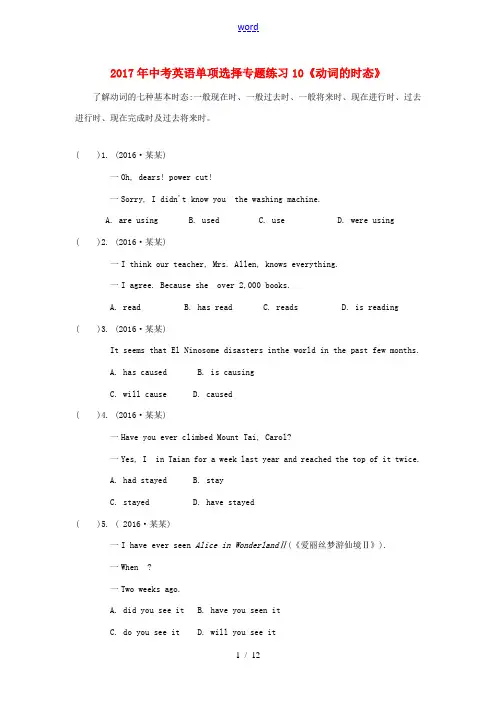
2017年中考英语单项选择专题练习10《动词的时态》了解动词的七种基本时态:一般现在时、一般过去时、一般将来时、现在进行时、过去进行时、现在完成时及过去将来时。
( )1. (2016·某某)一Oh, dears! power cut!一Sorry, I didn't know you the washing machine.A. are usingB. usedC. useD. were using( )2. (2016·某某)一I think our teacher, Mrs. Allen, knows everything.一I agree. Because she over 2,000 books.A. readB. has readC. readsD. is reading( )3. (2016·某某)It seems that El Ninosome disasters inthe world in the past few months.A. has causedB. is causingC. will causeD. caused( )4. (2016·某某)一Have you ever climbed Mount Tai, Carol?一Yes, I in Taian for a week last year and reached the top of it twice.A. had stayedB. stayC. stayedD. have stayed( )5. ( 2016·某某)一I have ever seen Alice in WonderlandⅡ(《爱丽丝梦游仙境Ⅱ》).一When ?一Two weeks ago.A. did you see itB. have you seen itC. do you see itD. will you see it( )6. (2016·某某)Look! A doga blind man across theroadA. leadsB. leadC. is leadingD. led( )7. (2016·某某)This museumhere for over 80 years. Itone of the oldest buildings in this city.A is; was B. had been; isC. was; has beenD. has been; is( )8. (2016·某某)Hethe city since he graduated from college.A. has leftB. leftC. has been away from( )9. (2016.某某)一Can John play soccer with us, Mrs.. Black?一One moment, please. He on the phone to his cousin.A. talksB. talkedC. talkingD. is talking( )10. (2016·某某)SteveTV in the living room when hismother came in.A. was watchingB. watchesC. is watching( )11. (2016·某某)一It's the second time I came to Xiamen. It a lot.一Yes, it's more and more beautiful.A. was changingB. has changedC. will change( )12. (2016.龙东五市)Lei Fengfor many years, but his spiritis still encouraging us.A. diedB. has been deadC. has died( )13. (2016.龙东五市)一May I speak to Mr. Lee?一Sorry, he Harbin. He the city for two days.A. has been to; has been inB. has gone to; has been toC. has gone to; has been in( )14. (2016·某某)一Are you going to watch "Running Man" tonight?一No! I it with my parents only once. I don't think it's exciting. A. see B. have seen C. will see D. am seeing( )15. (2016·某某)The engineersa new puter in our classroom the whole yesterday morning, so we had our classes in the school hall.A. were fixingB. fixedC. have fixedD. are fixing( )16. (2016·某某)一Could you tell me where you found Miss Gao just now?一Certainly. In the principal's office. They happily at that time.A. are talkingB. have talkedC. were talking( )17. (2016·某某)一It's a great pity that the famous football player has gone to another club.一Don't worry! They another top star recently.A. buyB. boughtC. have bought:( )18. (2016·贵港)一Mom, I the Great Wall in the lasttwo years.一Well, I will take you there next month.A. don't visitB. won't visitC. haven't visitedD. didn't visit( )19. (2016·某某)Everyone wants to reach the top of the mountain,but all the happiness happens while youit.A. climbB. climbedC. are climbingD. have climbed( )20. (2016·某某、某某、崇左)一you everHan Hong singlive?一Of course. A couple of times in different cities.A. Have; seenB. Did; seeC. Do; seeD. Are; seeing‘( )21. (2016·某某)一What would you like to have for supper, Jack?一Either noodles or rice OK. I don't mind.A. areB. wereC. isD. was( )22. (2016·某某)一Jill, who that in the white coat?一It's my brother, Joe.A.didB. doesC. areD. is( )23. (2016·某某)一Does Jimmy still work as a driver?一No. He has for two years.A. left the panyB. gone to ShanghaiC. studied in collegeD. lost his job( )24. (2016·)一Where did you go last weekend?一I to the Great Wall.A. goB. wentC. will goD. have gone( )25. (2016·)Please don't make so much noise. The baby now.A. sleepsB. sleptC. will sleepD. is sleeping( )26. (2016·)It's nice to see you again. We each other since 2014.A. won't seeB. don't seeC. haven't seenD. didn't see ( )27. (2016·某某)一I heard your father had gone to Beijing on business.一Yes. And he in three weeks.A. will returnB. has returnedC. returnedD. returns( )28. (2016·某某)一Have you watched the new movie Kung Fu Panda 3, Kelly?一Not yet. I it with my classmatetonight.A. will watchB. was watchingC. have watched( )29. (2016·随州)My husband alwaysme flowers everyweek before we got married, but now he never.A. sent; doesB. sends; doesC. was going to send; doD. sent; do( )30. (2016·随州)一Have you returned the book to the library yet?一Not yet. Don't worry. I it soonA. returnB. returnedC. have returnedD. will return ( )31. (2016·某某)Last week Viviana dress for her motherwith her first-month salary.A. buyB. boughtC. will buyD. would buy( )32. (2016·永州)一 you everto the GreatWall?一Yes. Three times.A. Has; beenB. Have; beenC. Have; gone( )33. (2016·呼和浩特)一I have to be off right now.一What a pity! I you could stay a little longer with us.A. thoughtB. am thinkingC. thinkD. was thinking( )34. (2016·某某)School violence(暴力) much attention of the whole society and people are calling thegovernment to make laws against it as early aspossible.A. drewB. will drawC. has drawnD. was drawing( )35. (2016·某某)Unless the weather, we will have tocancel the pinic.A. improveB. improvesC. improvedD. will improve( )36. (2016·某某)Grandpaglasses when he reads.A. wearsB. woreC. has wornD. was wearing( )37. (2016·某某)Just go down this road and youthelibrary next to the bankA. seeB. sawC. have seenD. will see( )38. (2016·某某)Our teamanother point! I am sure we'llwin the game.A. will getB. has gotC. is gettingD. was getting( )39. (2016·某某)一Sorry, Tom. I can't find the book you me.一It's OK. I don't need itA. lendB. have lentC.( )40. (2016·某某)I don't feel very well, Jack. I'm afraid you meyour cold.A. giveB. had givenC. have givenD. would give( )41. (2016·某某)一Anita, where is your brother?一He out in the garden with a group of kids.A. playsB. playedC. is playingD. has played( )42. (2016·某某)一Don't you see the sign "No parking" on the right?一Sorry, I . But now I know parking here is not right.A. don'tB. didn'tC. hadn'tD. doesn't( )43. (2016·某某)Wehave a piic together with ourteachers next Thursday.A. are goingB. are going toC. will goingD. may going to ( )44. (2016.某某)With the development of science and technology,robot cooksin our families in thefuture.A. appearB. appearedC. will appearD. were appearing( )45. (2016.某某)My mind wasn't on what he was saying so I'mafraid Ihalf of it.A. missedB. was missingC. will missD. would miss( )46. (2016·某某)Oh no! Imy book in the lab.A. leaveB. leftC. will leaveD. was leaving( )47. (2016·某某)I still remember my happy childhood when mymother me to Disneyland at weekends.A. takesB. tookC. will takeD. has taken( )48. (2016·某某)一Is Peter ing?一No, he his mind after a phone call atthe last minute.A. changeB. changedC. was changing( )49. (2016·某某)一Did you see a man in black pass by just now?一No, sir. I my car.A. washB. washedC. am washingD. was washing( )50. (2016·庐州)一Jenny, when did you move here?一I here for three years.A. livedB. movedC. have movedD. have lived( )51. (2016·某某)一What a nice watch! How long you it?一For just two weeks.A. will; buyB. have; hadC. were; havingD. did; buy( )52. (2016·某某)Youyour sunglasses again! Youshouldn't have bought the cheapest one just tosave a few dollars.A. have brokenB. breakC. will break( )53. (2016·资阳)一Look, the light is still on in Helen's office.一Maybe she her work yet.A. doesn't finishB. won't finishC. hasn't finishedD. didn't finish ( )54. (2016.某某)一Lucy has to London. How can I get in touch with her?一Don't worry. She will phone you as soon as she there.A. been; will getB. been; getsC. gone; will getD. gone; gets( )55. (2016·某某)I saw Sam and David in the playground yesterdayafternoon. Theygames withtheirclassmates then.A. playB. will playC. are playingD. were playing( )56. (2016·某某)一Did Billy and Anna find a way out at last?一Yes, they a plan and did it.A. were working outB. worked outC. are working outD. have worked out( )57. (2016·某某)"I want to go to Mars(火星), because it's a place that no oneto before,"said Carson.A. has goneB. has beenC. wasD. went( )58. (2016·某某)Nobody knows if he.If hehere, I'll call you at once.A. will e; will arriveB. will e; arrivesC. es; arriveD. es; will arrive( )59. (2016·某某)一I think I'll take a bus to the meeting.一The bus? If you , you will be late.A. doB. have doneC. will do( )60. (2016·某某)一Who is that lady?一She's Miss Green. She us music, and she is so good.A. taughtB. teachesC. will teachD. is teaching( )61. (2016·株洲)Don't enter the area. The studentsanEnglish examA. takesB. are takingC. have taken( )62. (2016·某某B)IChinese dishes for my foreign friendstomorrow evening.A. will cookB. have cookedC. cookD. cooked( )63. (2016·某某)一Oh, no! I can't find my mobile phone!一Well, where you last put it?A. haveB. doC. did( )64. (2016·某某)一Have you read this book?一Yes, I it two months ago.A. is readingB. have readC. will readD. read( )65. (2016·达州)一Please look at these stamps. I them for five years.一Wow, they are fantastic!A. have keptB. have boughtC. borrowedD. kept( )66. (2016·某某)The waterdark and dirty. It's no longer safe to drink.A. becameB. has beeC. will beeD. was being( )67. (2016·内江)I can't find my wallet anywhere. I'm sure Iit.A. lostB. will loseC. loseD. have lost( )68. (2016·某某A)Don't worry. Bill will help you look after your dogwhen youaway on business.A. areB. wereC. will beD. have been( )69. (2016·黄冈)一Where are you going, Bob?一To go hiking. Eric for me at the school gateA. was waitingB. waitsC. waitedD. is waiting( )70. (2016·某某)My parentsto work by the time Iup.A. began; getB. had begun; had gotC. had begun; got( )71. (2016·某某)一Where were you when I called?一I on the bed.A. liedB. was lyingC. layD. was Being( )72. (2016·某某)I think it is true that Jillto work todaybecause she is on a trip.A. has eB. didn't eC. is ingD. will not e( )73. (2016·乌鲁木齐)一You don't watch the movie?一Yes, but by the time I to the cinemathe moviefor several minutes.A. got; has begunB. got; had been onC. got; had begunD. got; has been on( )74. (2016·某某)一I shouted to you at the gate, but you didn't hear me.一Really? I a telephone call to my mother.A. makeB. was makingC. madeD. have made( )75. (2015·某某)Too many people were absent. The chairpersonwarned that hethe meeting ifnecessary.A. would cancelB. cancelledC. would startD. started参考答案1~5:D、B、A、C、A 6~10:C、D、C、D、A11~15:B、B、C、B、A 16~20:C、C、C、C、A 21~25:C、D、C、B、D 26~30:C、A、A、A、D 31~35:B、B、A、C、B 36~40:A、D、B、D、C 41~45:C、B、B、C、A 46~50:B、B、B、D、D 51~55:B、A、C、D、D 56~60:B、B、B、A、B 61~65:B、A、C、D、A 66~70:B、D、A、D、C 71~75:B、D、B、B、A。
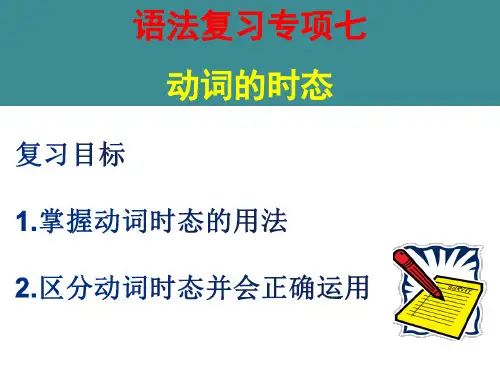
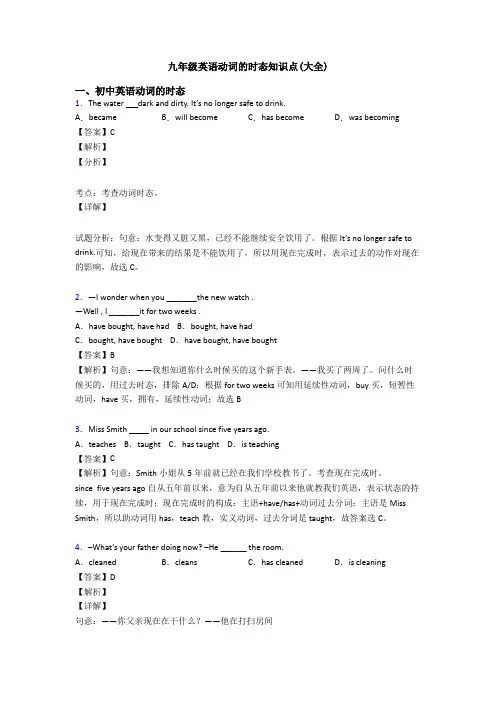
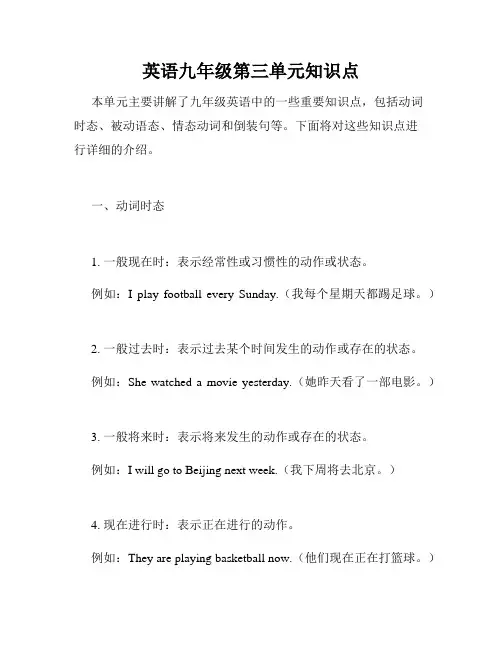
英语九年级第三单元知识点本单元主要讲解了九年级英语中的一些重要知识点,包括动词时态、被动语态、情态动词和倒装句等。
下面将对这些知识点进行详细的介绍。
一、动词时态1. 一般现在时:表示经常性或习惯性的动作或状态。
例如:I play football every Sunday.(我每个星期天都踢足球。
)2. 一般过去时:表示过去某个时间发生的动作或存在的状态。
例如:She watched a movie yesterday.(她昨天看了一部电影。
)3. 一般将来时:表示将来发生的动作或存在的状态。
例如:I will go to Beijing next week.(我下周将去北京。
)4. 现在进行时:表示正在进行的动作。
例如:They are playing basketball now.(他们现在正在打篮球。
)5. 过去进行时:表示过去某一时刻正在进行的动作。
例如:We were studying when the teacher came in.(当老师进来时,我们正在学习。
)二、被动语态被动语态表示主语是动作的接受者,而不是执行者。
构成被动语态的基本形式是“be + 过去分词”。
被动语态常用于以下情况:1. 当我们不知道或不关心动作的执行者时。
例如:The book was written in 1990.(这本书是在1990年写的。
)2. 当我们要强调动作的接受者时。
例如:The letter was sent to Mary by her friend.(这封信是由她的朋友寄给玛丽的。
)三、情态动词情态动词用来表示可能性、能力、许可、建议等。
常见的情态动词有can、could、may、might、shall、should、will、would、must等。
下面列举了一些常用的情态动词和其用法:1. Can:表示能力、许可或可能性。
例如:I can swim.(我会游泳。
)2. Could:表示过去的能力、可能性或请求。
人教版九年级英语语法总结英语语法是英语学习中的重要部分,掌握语法规则可以帮助我们更加准确地表达自己的观点和意思。
下面是。
一. 时态1. 一般现在时一般现在时常用于表示经常性的动作、客观事实以及常规的行为习惯。
例如:"I go to school every day."2. 一般过去时一般过去时用于表示过去发生的事情。
例如:"I watched a movie yesterday."3. 一般将来时一般将来时用于表示将来发生的事情。
例如:"I will go shopping tomorrow."4. 现在进行时现在进行时用于表示现在正在进行的动作。
例如:"She is reading a book now."5. 过去进行时过去进行时用于表示过去某一个时间点正在进行的动作。
例如:"They were playing games at 6:00 yesterday evening."6. 过去将来时过去将来时用于表示过去某一时间点将要发生的动作。
例如:"He said he would go to the park after school."二. 语态1. 被动语态被动语态用于强调动作的接受者,常用结构为"be + 过去分词"。
例如:"The TV was broken by my brother."2. 主动语态主动语态用于强调动作的执行者,常用结构为"主语 + 动词"。
例如:"I ate an apple for breakfast."三. 句型1. 倒装句倒装句主要用于强调或提前句子的某个成分,常见的倒装形式有完全倒装和部分倒装。
例如:"Not only did she study English, but she also practiced speaking it every day."2. 条件句条件句用于表示某种条件下可能发生的情况,分为三种类型:一般条件句、虚拟条件句和真实条件句。
人教版九年级语法总结.doc人教版九年级英语语法总结第一部分:时态一般现在时:表示经常发生的动作或存在的状态。
构成:主语 + 动词原形/动词第三人称单数形式例句:She speaks English fluently.一般过去时:表示过去发生的动作或状态。
构成:主语 + 动词过去式例句:They visited the museum last week.一般将来时:表示将来发生的动作或状态。
构成:主语 + will + 动词原形 / 主语 + am/is/are going to + 动词原形例句:I will travel to Japan next year.现在进行时:表示正在发生的动作。
构成:主语 + am/is/are + 现在分词例句:She is reading a book.过去进行时:表示过去某一时刻正在进行的动作。
构成:主语 + was/were + 现在分词例句:They were playing basketball at that time.现在完成时:表示过去发生的动作对现在造成的影响或结果。
构成:主语 + have/has + 过去分词例句:I have finished my homework.过去完成时:表示过去的过去完成的动作。
构成:主语 + had + 过去分词例句:She had finished her homework before I called her. 将来进行时:表示将来某一时刻正在进行的动作。
构成:主语 + will be + 现在分词例句:He will be studying at that time.将来完成时:表示将来某一时间之前完成的动作。
构成:主语 + will have + 过去分词例句:We will have finished the project by next month. 第二部分:被动语态一般现在时被动语态:am/is/are + 过去分词例句:The letter is written by him.一般过去时被动语态:was/were + 过去分词例句:The house was built in 2010.一般将来时被动语态:will be + 过去分词例句:A new school will be built next year.现在完成时被动语态:have/has been + 过去分词例句:The problem has been solved.其他时态的被动语态:相应时态的构成+过去分词例句:The book was being read by her when I entered.第三部分:非谓语动词动名词:动词+ing,用作主语、宾语等。
动词时态(教学设计)一、教学内容六种动词时态二、教学目标(一)复习六种时态的定义,构成规则(二)能正确的运用动词的三种时态三、重点难点(一)初中英语动词六种时态的定义、规则(二)初中英语动词六种时态的用法四、教学过程(一)动词的时态在英语中,由于谓语动词发生的时间不同,或表达不同时间存在的状态,谓语动词都要发生相应的变化,这些动词的形式就叫做动词的时态。
英语共有16种时态,现阶段学生已学习6种。
现以动词do为例,将这6种时态构成列表如下:①现在:一般现在时:①do ②does;现在进行时:am/is/are doing;现在完成时:has/have done②过去:一般过去时:did;过去进行时:was/were doing③将来:一般将来时:①am/is/are going to do ②will/shall do1.一般现在时:(1)构成:①动词原形②动词第三人称单数形式(2)形式:①be动词:肯定句:主语+am/is/are+表语(n./pron./adj.)eg:I am/I’m a student. You are/You’re a student. He is/He’s/She is/She’s a student.否定句:主语+am/is/are+not+表语(n./pron./adj.)eg:I am not/I’m not a student. You are not/You’re not/You aren’t a student.疑问句:Am/Is/Are+主语+表语(n./pron./adj.)eg:Am I a student? Are you a student? Is he/she a student? Is it an apple?②其它动词:肯定句:主语+动词原形/第三人称单数形式(+宾语)(+状语)eg:I/You/We/You/They study English every day.否定句:主语+don’t/doesn’t(第三人称单数)+动词原形(+宾语)(+状语)eg:I/You/We/You/They don’t study English every day.疑问句:Do/Does+主语+动词原形(+宾语)(+状语)eg:Do I/You/We/You/They study English every day?(3)用法:①表示经常发生的动作或现在存在的状态eg:I go to school every day except Sunday.除了星期日,我每天都上学。
Exercise( )1. What _____ you _____ over the weekend?A. will; doB. does; doC. did; doD. were,; doing( )2. Xiao Li usually _____ to school by bike last year.A. goesB. wentC. will goD. is going( )3. What _____ in our town 100 years from now?A. happenedB. is happenedC. has happenedD. will happen ( )4. Mr. Smith _____ to see you in an hour.A. cameB. has comeC. will comeD. comes( )5. _____ you _____ from your parents recently?A. Did; hearB. Have; heardC. Do; hearD. Will; hear( )6. We _____ TV at home this time last night.A. were watchingB. watchedC. have watchedD. would watch ( )7. We _____ over 1500 English words by the end of last month.A. have learnedB. had learnedC. will learnD. learnt( )8. She _____ in Shanghai for ten years since 1992.A. has livedB. had livedC. livedD. will live( )9. She _____ in Shanghai for ten years.A. has livedB. had livedC. livedD. will live( )10. We all know that the earth _____ round the sun.A. goesB. wentC. is goingD. will go( )11. “Where are the boys?” “They _____ soccer on the playground.”A. playB. are playingC. were playingD. played( )12. Look! Lucy _____ under the tree.A. readsB. is readingC. was readingD. read( )13. He _____ more than 200 model cars in the last five years. A. has collected B. had collected C. collected D. will collect( )14. Jim _____ a letter to his parents at 7:30 last night.A. had writtenB. wroteC. would writeD. was writing( )15. The Smiths _____ in Beijing since two weeks ago.A. stayedB. were stayingC. would stayD. have stayed( )16. “When _____ you _____ the bike?” “Last Monday.”A. have; boughtB. did; buyC. will; buyD. do; buy( )17. Look! The boy _____English now.A. likesB. likedC. is likingD. was liking( )18. Most students in our class _____ TV twice a week.A. watchB. watchedC. will watchD. are watching( )19. How soon _____ they _____ back from work?A. do; comeB. did; comeC. have; comeD. will; come( )20. “Where _____ you _____ Mr. Li?” “In his office, half an hour ag o.”A. will; seeB. did; seeC. have, seenD. do; see( )21. I _____ a new dictionary. Look! It’s very useful.A. boughtB. will buyC. have boughtD. would buy( )22. I won’t watch the movie tonight. I _____ it before.A. will seeB. have seenC. sawD. had seen( )23. Hello! I _____ know you _____ in Chengdu. How long have you b een here?A. didn’t; wereB. don’t areC. didn’t; areD. don’t; were( )24. He _____ a fire and then cooked a meal.A. had madeB. was makingC. madeD. has made( )25. If I _____ time tomorrow, I will go to visit my grandfather.A. haveB. will haveC. would haveD. am having( )26. I’m going to be a doctor when I _____ up.A. growB. will growC. grewD. am growing( )27. The film _____ on for five minutes when I got to the cinema.A. has beenB. had beenC. wasD. is( )28. She _____ dinner when her son came in.A. has cookedB. had cookedC. was cookingD. would cook( )29. The train _____ when we got to the station. We had to wait for the next one.A. has leftB. had leftC. leftD. was leaving( )30. He said that he _____ to the barber’s tomorrow morning.A. will goB. wentC. is goingD. would go)31. In the last years I _____ a lot of friends.A. have madeB. madeC. will makeD. was making( )32. The boys _____ for about two hours.A. are playing soccerB. have been playing soccerC. were playingD. play soccer。